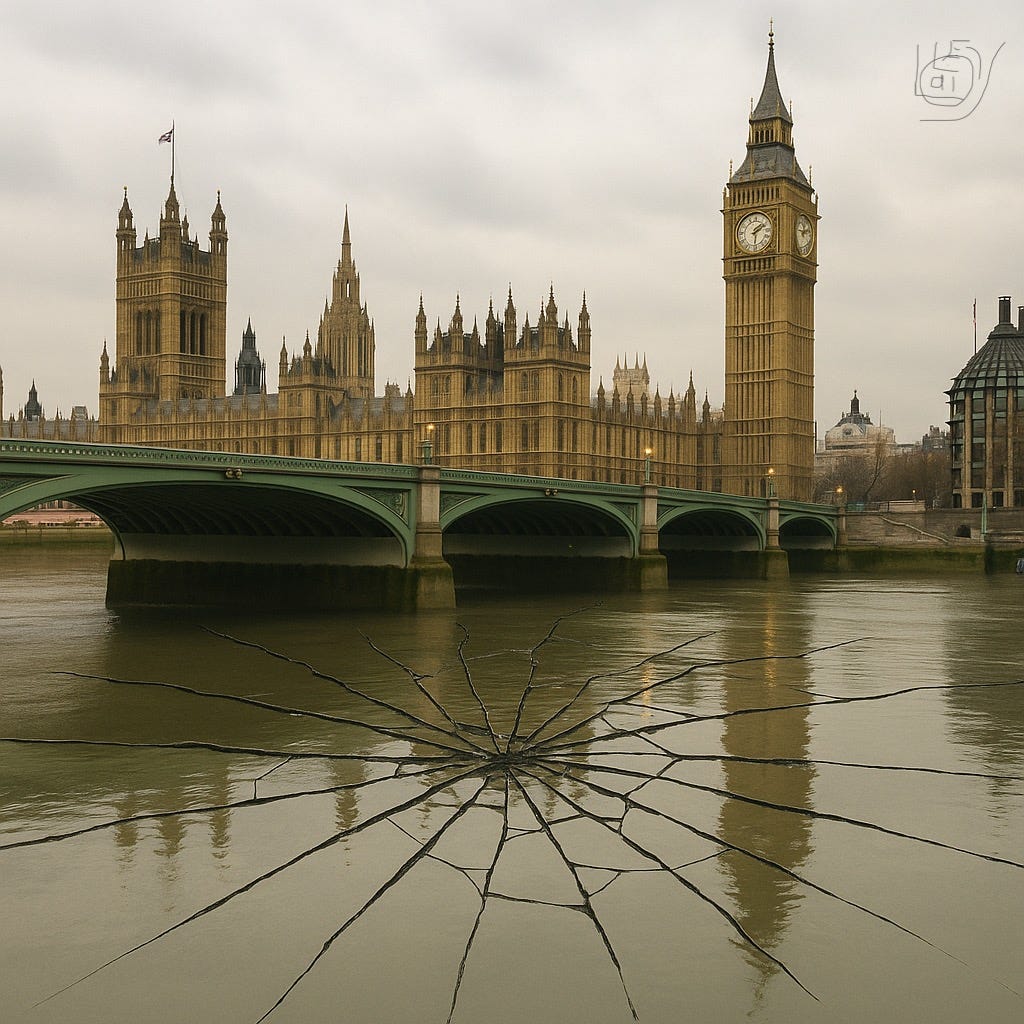GRIT | The Party That Lost Britain By Mike Olley — GRIT Founder & Editor
You can’t fix fourteen years of decay with one speech in a conference hall.
The Party That Lost Britain
There comes a moment in every democracy when the people stop listening to excuses.
Britain is at that moment now
The Conservative Party, which once claimed to be the guardian of order and stability, has left behind a nation weary, poorer, and profoundly disillusioned. It isn’t just political failure. It is a moral failure — one that has shredded public trust and broken the covenant between government and governed.
At this year’s Tory conference, Kemi Badenoch thundered about “hard lines” and “removals forces”, promising to deport 150,000 migrants a year. She is trying to sound tough because her party looks weak.
But the British people have heard this tune before.
They heard it from Johnson, from Patel, from Braverman, from Sunak — and each time the same story played out: loud speeches, fancy slogans, and then nothing.
The Illusion of Control
“They weren’t tough. They were useless.”
Under Conservative rule, enforced deportations fell to their lowest level in two decades, while asylum backlogs soared beyond 134,000 cases. The list of people legally required to leave the country but still here — the so-called “removal-liable” group — hit over 41,000 by the end of 2023.
Those aren’t activist statistics; they come from the Home Office itself.
So while ministers shouted about “stopping the boats”, they quietly presided over the biggest breakdown in immigration control since records began.
Why They Let It Happen
The Conservatives didn’t just fail through incompetence — they failed because failure suited them.
The post-Brexit economy still relied on cheap labour. Rather than train British workers or raise wages, the government kept migration high and let business donors stay happy. Meanwhile, it pretended to be clamping down.
Inside the party, two tribes cancelled each other out:
Free-market globalists wanted open labour markets.
Populist nationalists wanted fortress Britain.
To please both, they did both and neither — tightening rhetoric, loosening enforcement. It became a politics of permanent crisis, a revolving door of outrage and inaction.
The Politics of Paralysis
Every failure became a photo opportunity.
Every delay was spun as proof that “tougher laws” were needed.
The asylum backlog wasn’t a scandal — it was a prop for speeches.
Meanwhile, hospitals buckled, councils collapsed, and debt soared. Ministers told the country to tighten its belt while they collected donor cheques and padded ministerial pensions.
They governed as if they were already expats, detached from consequence — living politically in Dubai, insulated, indifferent, and utterly unaccountable.
The Wreckage They Left
By the time Labour came to power in 2024, the so-called “party of competence” had left behind a border system that didn’t work, a workforce that wasn’t trained, and a public that no longer believed a word their leaders said.
It wasn’t just policy failure — it was a collapse of duty.
When a government stops caring about truth, the democratic bond itself begins to rot.
The New Rebellion on the Right
Into that vacuum steps Reform UK.
Whatever one thinks of Nigel Farage and his crew, they have captured something real — the rage of voters who once believed the Conservatives cared about Britain.
Reform’s rise isn’t a fluke; it’s a referendum on Tory collapse.
They’re taking councils, mayoralties, and chunks of the working-class vote the Conservatives once owned. They’ve become, for now, the vessel of ordinary anger.
And look at the timing: Reform’s polling has jumped about three points since Labour’s conference, and another rise is expected after the Tory gathering ends — because the electorate aren’t mugs.
They can smell sincerity and they can smell spin.
The Angela Rayner story may have muffled Reform’s conference message, but not the public’s instinct. Over the course of this conference season, Reform are surging again, while the old parties flounder in stale theatre.
The Badenoch Illusion
Badenoch’s attempt to rebrand the party as hard-edged and credible only exposes how hollow the Conservatives have become.
Her promise of a US-style “Removals Force” sounds muscular until you ask where the deportees will go — and who will pay.
She doesn’t answer, because she can’t.
It’s all puff, and Britain knows it.
You can’t rebuild trust with the same slogans that destroyed it.
The Verdict
It’s clear that the electorate have grown weary of grand promises and short memories. The Conservatives’ long period in office ended not because of one scandal or one leader, but because of a slow, steady erosion of confidence.
Fourteen years of inconsistency, contradiction and complacency have left the public doubtful that the party can be trusted to govern with purpose again. That doubt may not be permanent, but it will take more than slogans and soundbites to reverse.
If the party is to have any future, it will need to rediscover the idea of service — the notion that government exists for the public good, not for political survival.
As things stand, Britain appears ready to move on, searching for something that feels more honest, more grounded, and less trapped in the theatre of the past.
GRIT Comment:
The Conservative Party stands at a crossroads. Whether it can rebuild credibility is uncertain, but the message from the public is unmistakable: words are no longer enough. Reform’s surge may prove fleeting or formative, yet it signals a deeper truth — that British politics is shifting again, and voters are prepared to look elsewhere until trust is earned back.



